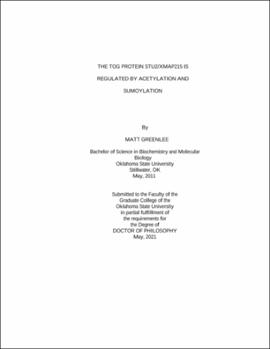| dc.contributor.advisor | Miller, Rita K. | |
| dc.contributor.author | Greenlee, Matt | |
| dc.date.accessioned | 2021-08-30T15:26:32Z | |
| dc.date.available | 2021-08-30T15:26:32Z | |
| dc.date.issued | 2021-05 | |
| dc.identifier.uri | https://hdl.handle.net/11244/330742 | |
| dc.description.abstract | Microtubules are an essential element of the cytoskeleton responsible for myriad functions which include cell shape, intra-cellular trafficking, cellular motility, and cellular division. The primary architects of these structures are the XMAP215 family of microtubule polymerases, which includes Stu2 in S. cerevisiae. XMAP215 family members are well known to function at four distinct locations on microtubules. During mitosis, XMAP215 members select for correct bi-oriented attachment with sister chromatid bound kinetochores in order to properly divide the genetic information found in chromosomes. XMAP215 is also found at the minus ends of microtubules at Microtubule Organizing Centers where it is believed to function in microtubule nucleation. In addition to these two locations, XMAP215 family members have been observed along the microtubule lattice as well as microtubule plus ends where they polymerize growing microtubules. | |
| dc.description.abstract | Here I demonstrate the XMAP215 family of microtubule polymerases are regulated by Small Ubiquitin-Like Modifiers (SUMO) and acetylation. Using two hybrid analysis, we mapped a minimal SUMO interacting region of Stu2 to its domain responsible for dimerization using yeast two-hybrid. With subsequent immunoprecipitation and SUMO affinity enrichment assays, we demonstrated with a high-degree of certainty that Stu2 is both covalently modified by SUMO and interacts with SUMO non-covalently. While searching by mass spectrometry for the lysines within Stu2 that are covalently modified by SUMO, we identified acetylated lysine residues. Immunoprecipitation and western blotting were used as a second method to demonstrate the acetylation of Stu2. Functional assays demonstrated that Stu2 acetylation regulates microtubule polymerization, chromosome segregation, and promoted interactions with y-tubulin. | |
| dc.format | application/pdf | |
| dc.language | en_US | |
| dc.rights | Copyright is held by the author who has granted the Oklahoma State University Library the non-exclusive right to share this material in its institutional repository. Contact Digital Library Services at lib-dls@okstate.edu or 405-744-9161 for the permission policy on the use, reproduction or distribution of this material. | |
| dc.title | TOG protein Stu2/XMAP215 is regulated by acetylation and sumoylation | |
| dc.contributor.committeeMember | Deng, Junpeng | |
| dc.contributor.committeeMember | Soulages, Jose L. | |
| dc.contributor.committeeMember | Clarke, Stephen | |
| osu.filename | Greenlee_okstate_0664D_17060.pdf | |
| osu.accesstype | Open Access | |
| dc.type.genre | Dissertation | |
| dc.type.material | Text | |
| dc.subject.keywords | acetylation | |
| dc.subject.keywords | microtubules | |
| dc.subject.keywords | stu2 | |
| dc.subject.keywords | sumoylation | |
| dc.subject.keywords | tubulin | |
| dc.subject.keywords | xmap215 | |
| thesis.degree.discipline | Biochemistry and Molecular Biology | |
| thesis.degree.grantor | Oklahoma State University | |
